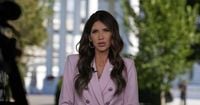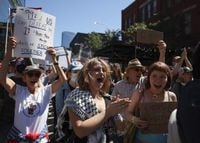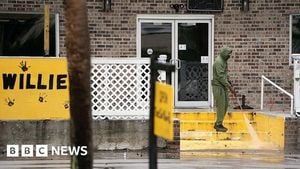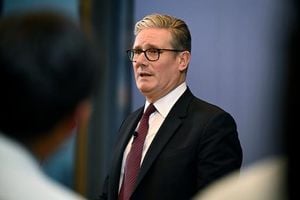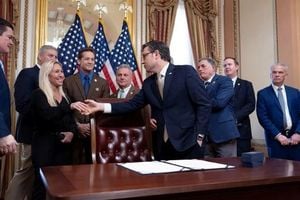On August 25, 2025, President Donald Trump signed an executive order that has set off a political firestorm across the nation, particularly in Chicago. The order directs state National Guard units to be ready to assist federal, state, and local law enforcement in quelling civil disturbances and maintaining public safety. It also establishes a "standing National Guard quick reaction force" for nationwide deployment—an unprecedented move in recent American history, as reported by Iowa Capital Dispatch.
The executive order, which tasks Defense Secretary Pete Hegseth with ensuring National Guard troops are resourced, trained, and available for rapid mobilization, marks a dramatic expansion of the federal government’s potential role in domestic policing. The order specifically instructs Hegseth to work with the adjutant generals of each state to determine how many troops should be on standby for these purposes. Traditionally, state National Guard units answer to their governors, except in emergencies, but Trump’s directive could shift that balance.
Trump’s move follows his recent mobilization of the District of Columbia National Guard, a force he can control directly since the District is not a state. Troops from West Virginia, Louisiana, Ohio, Mississippi, Tennessee, and South Carolina have also been sent to Washington, D.C. in recent weeks. According to Iowa Capital Dispatch, these deployments were justified by the administration as necessary to "solve" crime in major cities—though the president left some ambiguity about whether he would override governors who objected to having troops deployed in their cities.
Chicago, the nation’s third-largest city, has become the next potential flashpoint. President Trump has repeatedly described crime in Chicago as “TOTALLY OUT OF CONTROL” and, over the weekend, called Illinois Governor J.B. Pritzker “weak and pathetic,” warning that “he better straighten [crime] out, FAST, or we’re coming!” as reported by The Washington Post and CBS. Trump has floated the idea of sending the National Guard into Chicago, but has also indicated he might wait for a request from local officials—or simply act unilaterally if he deems it necessary. “We may or may not. We may just go in and do it, which is probably what we should do,” Trump said, expressing frustration with what he characterized as ungratefulness from some governors.
Governor Pritzker has been unequivocal in his opposition. In an interview with CBS’s Face the Nation, he warned, “We hope that they don’t send any troops along with ICE, and if they do, they’ll be in court pretty quickly, because that is illegal.” Pritzker described the potential deployment as “an invasion with U.S. troops,” and accused the president of using the pretext of crime to pursue other aims, including interfering with the 2026 elections. “He’ll just claim that there’s some problem with an election, and then he’s got troops on the ground that can take control if, in fact, he’s allowed to do this,” Pritzker asserted.
Chicago Mayor Brandon Johnson echoed Pritzker’s sentiments at a spirited Labor Day rally near the historic Haymarket Memorial. “No federal troops in the city of Chicago! No militarized force in the city of Chicago!” Johnson declared to cheers from hundreds of residents and labor leaders. “We’re going to defend our democracy in the city of Chicago. We’re going to protect the humanity of every single person in the city of Chicago.” According to the Chicago Tribune, the rally was a clear display of local resistance to what many in the city see as federal overreach.
The backdrop to these tensions is the Trump administration’s broader immigration enforcement agenda. Secretary of Homeland Security Kristi Noem told CBS’s Face the Nation that the administration plans to increase Immigration and Customs Enforcement (ICE) raids in major cities, including Chicago. “We’ve already had ongoing operations with ICE in Chicago and throughout Illinois and other states, making sure that we’re upholding our laws, but we do intend to add more resources to those operations,” Noem said. She defended the administration’s actions in Los Angeles earlier this year, where ICE raids led to protests and the deployment of the National Guard and Marines—moves made without the consent of California’s Democratic Governor Gavin Newsom, who has since challenged Trump’s authority in court.
Noem also cited other cities such as Boston and San Francisco as potential targets for increased ICE operations. She suggested that cities should welcome federal intervention to make them “safer, more prosperous,” and pointed to Washington, D.C., as an example where, in her words, residents now enjoy “going out to eat at night and not having to worry if they’re going to be a victim of a carjacking or a robbery.”
But local leaders and activists in Chicago see things very differently. The Labor Day rally, which drew hundreds of participants, was marked by passionate speeches from union leaders and activists. Bob Reiter, president of the Chicago Federation of Labor, criticized Trump as a “bad dude” for undermining union contracts and scapegoating immigrants and diversity initiatives for the nation’s problems. Stacy Davis Gates, president of the Chicago Teachers Union, declared, “Solidarity is the antidote to white supremacy. Solidarity is the antidote to anti-immigrant fever. Solidarity is the antidote to homophobia and transphobia.” After the rally, protesters marched through the West Loop, targeting businesses seen as aligned with Trump’s policies.
Meanwhile, civil liberties advocates have voiced alarm about the implications of the executive order. Free DC, a group advocating for district self-governance, called Trump’s move “dictatorial,” warning, “Trump is laying the groundwork to quell all public dissent to his agenda. If he is successful, it would spell the end of American democracy.”
The legal and constitutional stakes are high. The 1878 Posse Comitatus Act generally prohibits federal military forces from engaging in domestic law enforcement, and legal experts—including those cited by Chicago Tribune—have said the use of the military for policing American cities is unconstitutional. California’s ongoing lawsuit over the federalization of its National Guard underscores the likelihood of future courtroom battles if Trump proceeds with similar actions elsewhere.
Yet Trump has dismissed the criticism, insisting that most Americans support strong measures to crack down on crime. “They say, ‘We don’t need ‘em. Freedom, freedom. He’s a dictator, he’s a dictator,’” Trump said of his detractors. “A lot of people are saying, ‘Maybe we like a dictator.’ I don’t like a dictator. I’m not a dictator. I’m a man with great common sense and a smart person. And when I see what’s happening to our cities, and then you send in troops, instead of being praised, they’re saying, ‘You’re trying to take over the republic.’ These people are sick.”
The coming days are likely to see further escalation, both in rhetoric and possibly on the streets. With ICE raids reportedly imminent in Chicago and the National Guard on standby, the city stands at the center of a national debate over the limits of presidential power, the role of the military in civil society, and the future of American democracy. As the legal, political, and moral arguments play out, Chicagoans are bracing for what could be a defining moment in the city’s—and the country’s—history.
